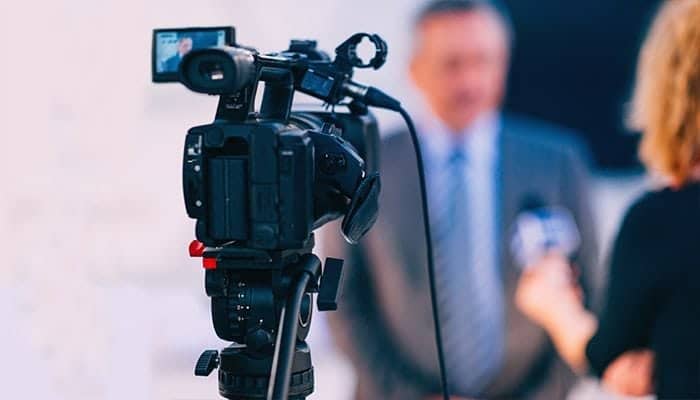Speaking In Front Of A Camera: Get Used To It
During our Public Speaking Training workshops, it’s standard practice for us to set up a camera and videotape every presentation given by our attendees. We do this for a couple of reasons: First, our feedback is more meaningful when workshop participants can see what we see. When we have video footage that we can review together, it’s much easier to point out specific parts of the presentation and provide praise or offer advice. This practice alone has been instrumental in transforming timid and self-conscious people into confident and effective public speakers.
Another benefit of videotaping workshop presentations is that it gets people used to speaking in front of a camera. Our training does not require workshop participants to speak directly to the camera, but if that’s a skill they want to improve, we’ll provide training specifically for it. Because speaking in front of a camera is a lot different than speaking in front of a group of people—and you’ll probably end up doing it a lot more than you expect.
Your Fear of Public Speaking On Camera Can Be Overcome
CNN may never call you for a live television interview, but there are going to be many other times you’ll be expected on to speak on camera, like when you’re invited to attend a meeting via Skype or FaceTime. Video is fast becoming the Number 1 way that people send and receive information and it allows people to connect “in person” from anywhere in the world. If you were called on to deliver a presentation through Google Hangouts today, how do you think you’d fare?
If you have a fear of speaking on camera, you can take comfort in the fact a lot of people feel the same way. There’s something unnerving about staring at that tiny computer cyclops. But whether you’re standing in the same room as your audience or speaking to them via a video connection, it’s all public speaking. And you want to do it well.
Tips For Speaking On Camera
A friend of mine, who for years belonged to a small community theatre group, compared the way theater actors must move and behave compared to movie actors. In any theater performance, the audience must watch from afar and therefore the actors’ facial expressions and gestures must be exaggerated in order for everyone to see them. A small gesture, such a wink, is difficult to see, so the actor must turn to the audience and make that wink very obvious. But in the movies, even the slightest facial expression can be picked up by a camera that’s pointed directly at an actor’s face.
It’s a similar situation when you’re speaking on camera as opposed to standing in front of an audience. You have to remember that most of what people will see is your face, and they’ll see even the slightest facial expression. With that in mind, these tips will help improve your video presence:
Smile with your eyes. A fake smile stops at your mouth; a genuine smile shows on your whole face.
Speak naturally. Use language appropriate for your audience. Talking to the camera may feel like you’re talking to yourself, but you’re not.
Practice looking into the camera as you speak. It’s the equivalent to having good eye contact — and it’s important!
Sit up straight. Slouching in front of the camera relays disinterest and laziness. Sit up straight so you look and sound your best.
Break Out The Camera and Practice
The great thing about using a camera to practice your public speaking technique is that no one has to see the footage but you. So grab your phone, tablet, or any other recording device and get comfortable talking to the camera. It’s a skill that will serve you well.
Need help perfecting your public speaking form? We’re here to help. Contact us today to find out how our training programs will make you a more confident and effective public speaker.


For my next public speech, I will definetly practice in front of a camera before-hand. I think the advice this blog gives is great and this way I’ll be able to see where I made mistakes and how I can improve myself.
I used to speak in front of mirror for HOURS.
Now I’ll take your advice and use a camera.
Thanks. Nice article.
Cheers
Nice tips. I always had issues when recording myself for youtube videos. I will practice with the advice of this post.